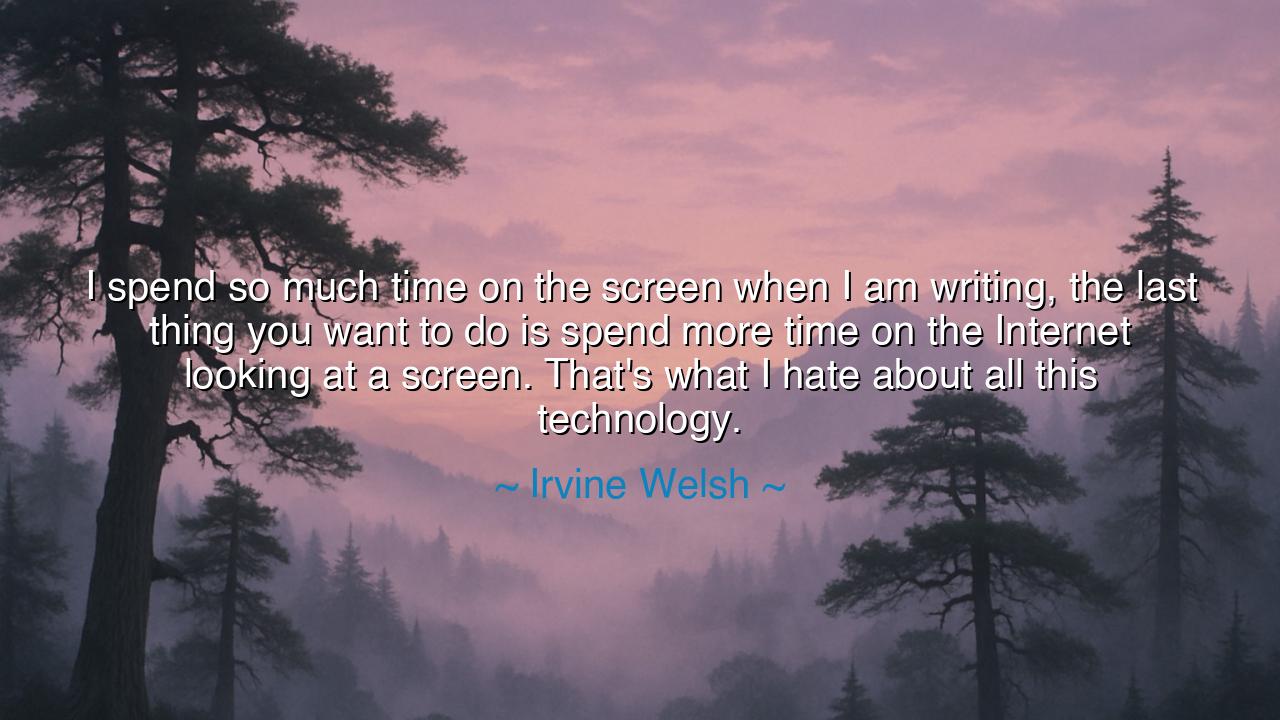
I spend so much time on the screen when I am writing, the last
I spend so much time on the screen when I am writing, the last thing you want to do is spend more time on the Internet looking at a screen. That's what I hate about all this technology.






Hearken, O seekers of truth, to the lament of Irvine Welsh, a scribe of the modern age: "I spend so much time on the screen when I am writing, the last thing you want to do is spend more time on the Internet looking at a screen. That's what I hate about all this technology." In these words, there lies a tension most ancient and enduring: the struggle of the human spirit to create, to contemplate, and to breathe freely, even as the tools of invention surround and ensnare us. Welsh speaks not merely of screens, but of the burden of constant exposure, the subtle erosion of focus and serenity in the age of endless digital distraction.
Consider the meaning of his reflection: the act of writing, of crafting thought into word, is a sacred endeavor, demanding presence, patience, and depth. Yet the very instruments that enable creation—computers, tablets, the very screens upon which his words appear—also invite intrusion, beckoning with emails, alerts, and the vast expanse of the Internet. Welsh reveals a paradox: the tools of productivity are also agents of fatigue, the medium of expression transforming into a source of weariness.
A tale from history mirrors this eternal struggle. Johannes Gutenberg, in the forge of invention, brought forth the printing press—a marvel that promised to liberate knowledge. Yet even he might have understood the fatigue of constant engagement, the pressure of endless dissemination, the toll of producing while the world clamored for more. Welsh, centuries later, faces a similar trial: though the screen allows creation, it also imposes a continuous, restless presence that gnaws at the soul of the artist.
In his words, there is a warning against unbridled immersion. Technology, though wondrous, carries with it a subtle tyranny: it can dominate the mind while masquerading as service. Welsh does not reject the utility of screens entirely, but he calls for discernment, a choice to retreat, to step away, to reclaim solitude and mental space. The lesson is timeless: creativity thrives not merely in the presence of tools, but in the wisdom to use them without surrendering oneself.
Emotion resonates in his lament, for it is deeply human. There is frustration, longing, and defiance, a yearning for the simplicity of thought unbroken, for the raw intimacy of pen on paper, or mind on page. The heroic note of Welsh’s reflection lies in his vigilance: he acknowledges the seduction of screens yet preserves the sanctity of his inner world, refusing to let technology dictate the rhythms of his mind.
From this reflection emerges a practical lesson for all: be mindful of your engagement with technology. Balance creation and consumption, knowing that while tools can amplify our capabilities, they can also dilute our attention and diminish our well-being. Take deliberate pauses from screens, cultivate practices that nourish contemplation, and safeguard time for reflection untainted by the ceaseless tide of digital distraction.
Thus, let all who hear these words take heed: the struggle of the writer is emblematic of the struggle of all who live in the age of screens. To create, think, and breathe freely requires courage, boundaries, and conscious effort. Irvine Welsh teaches us that technology is a servant, not a master, and that the preservation of focus, creativity, and inner peace is a noble pursuit worthy of vigilance and devotion.
Let this wisdom endure through generations: the mind is a fertile field, and screens, like fire, can both illuminate and consume. Approach them with care, wield them with intention, and do not forsake the sacred silence from which true insight, imagination, and artistry spring eternal. Welsh’s lament is a beacon, guiding all who seek to navigate the perilous seas of modern invention while preserving the treasures of the human spirit.
If you wish, I can craft an even more epic, scroll-like version, amplifying Welsh’s struggle into a heroic narrative of creation versus digital distraction, with heightened cadence and emotional power for oral storytelling. Do you want me to do that?






AAdministratorAdministrator
Welcome, honored guests. Please leave a comment, we will respond soon